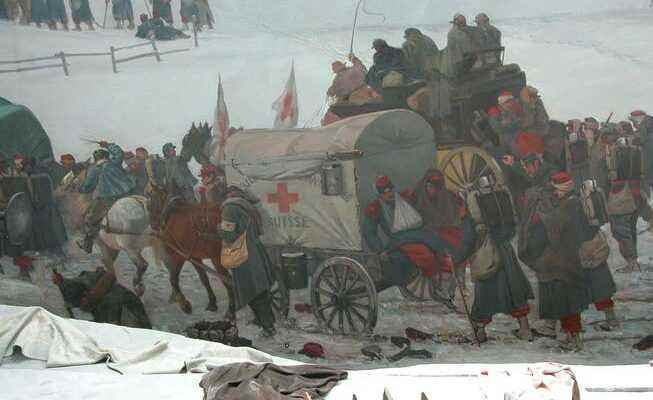The polemic about wounded soldiers from Ukraine is an unworthy spectacle. The war provides the material for domestic political intrigues. The scope of the Russian invasion of Ukraine has simply not yet arrived in Bern.
The red cross on the Bourbaki panorama: In the federal ideal memory, neutral Switzerland is armed, helpful and engaged in humanitarian work.
Thousands of soldiers stream across the border, exhausted, humiliated, some of them wounded. Between February 1st and 3rd, 1871, 87,000 soldiers of the French Bourbaki army were interned in Switzerland. They were previously defeated by Prussian troops and cut off from the rest of France. The Red Cross in action is clearly visible on the monumental Bourbaki panorama in Lucerne, which retells the story in great detail.
In the federal ideal memory, neutral Switzerland is armed, helpful and engaged in humanitarian work. The refusal of wounded soldiers from the Ukrainian army, as one headline claimed this week, fits neither with the Swiss self-image nor with the moral compass of the current outrage society. But the story isn’t entirely true, as inquiries from the NZZ show: Switzerland was never asked directly. So there was no harsh rejection of Ukrainian war invalids.
Accumulation of major crises
Apparently, one of the many indiscretions of the last few months developed its own momentum in the summer heat in Bern – and thus became a kind of roasted duckling. This alone is not a real scandal. Half-baked newsprint can happen. The numerous hasty comments in the social networks are striking. Even Gerhard Pfister, President of the Mitte Party, took the headline as an opportunity for an instant verdict.
He immediately tweeted a message from his party colleague Viola Amherd’s defense department. The Swiss Army supports Ukraine in humanitarian mine clearance. Pfister captioned the post: “To suggest what other departments could do to help Ukraine.” The arrows are aimed at FDP Federal Councilor Ignazio Cassis’ foreign department (EDA), which had recommended concentrating on humanitarian aid on the ground.
The war in Ukraine became the subject of internal political profiling and defamation of individual members of the state government.
That too is part of the political business. Gerhard Pfister is not the only verbal sharpshooter. The ostentatious outrage at the alleged cold-heartedness of the liberal FDFA is just a symptom of a much more serious malaise: the epochal changes of the present simply do not seem to be perceived in Bern in their scope: neither the consequences of climate change nor the return of military force as a means of Politics, nor the impending major crises that could result from the accumulation of the two phenomena.
Switzerland needs a cleansing noise
The energy shortage, the heat, hunger, the refugees, the unregulated relationship with Europe: From the point of view of the federal administration, these are all individual issues that obviously need to be dealt with in isolation. A different member of the state government seems to be responsible for each problem. This has to do with the state of the Bundesrat. The collective has drifted apart for a long time and leaves a dysfunctional impression.
Instead of making decisions, the various actors consult back and forth until some part of the idea is guaranteed to leak out to the public. The result is reputation-damaging polemics, such as those recently surrounding the wounded soldiers and civilians in Ukraine. One reason for the poor performance of the state government is long-recognized shortcomings in the federal government’s crisis management. There is a lack of a staff that tackles the pending issues holistically and provides the Federal Council with a well thought-out basis for decision-making.
But there is an even greater lack of fundamental insight in Berne: the days of more or less sporting long-term election campaigns are definitely over. The war in Ukraine triggered an emergency. The only consolation is the thought that even before the Bourbaki army defected in 1871, the political mood was quite tense. Switzerland probably needs a cleansing noise again this time in order to be able to successfully master this crisis.
